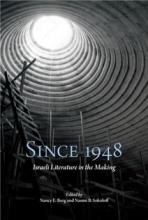In October of 2020, Dr. Naomi Sokoloff in the NELC Department at the University of Washington, and Dr. Nancy E. Berg at Washington University in St. Louis published Since 1948: Israeli Literature in the Making, an edited volume of articles that take up the ever-contentious topic of Israeli literature. In the book, Drs. Sokoloff and Berg aim to further complicate the notion of “a unified singular narrative of Israeli literature,” and instead encourage an “enlarged view of the diversity and heterogeneity” of that corpus.
By exploring the multilingual and transnational ways in which the canonical boundaries of Israeli literature have been “prodded, provoked, and imploded,” the collection of essays serves to “open up conversation about Israeli literature to multiple narrative strands.” Ultimately, Since 1948 posits Israeli literature as “a test case for considering the relevance of the category “national literature,” a question that would be of interest to any literary scholar in the present moment.
I spoke with Dr. Sokoloff about the movement to reassess the boundaries of Israeli literature, the place of Hebrew in that literary corpus, and Dr. Sokoloff’s own ongoing work to challenge the conceptual frameworks that narrowly associate language with nation-state within the University of Washington.
- What was the initial impetus for writing Since 1948?
Israeli literature has evolved and transformed dramatically since the end of the twentieth century. No one can keep up entirely! My colleague Nancy E. Berg and I convened a symposium in 2018 to talk about this topic, because we wanted to learn more about contemporary trends while reassessing the literary history and trajectories of Israeli culture since the founding of the state in 1948.
- Why is the distinction between Israeli and Hebrew literature so important in this book?
Hebrew literature is some three thousand years old, and it has grown and developed throughout the millennia. Modern Hebrew literature emerged in the 18th and 19th centuries. Until recently, Israeli writing was usually viewed as a new aspect of Hebrew literature. However, writers in Israel have composed texts not only in Hebrew, but in Yiddish, Russian, Arabic, English, Polish, Amharic, and other languages, as well. And, while Hebrew for millennia was primarily a sacred language and a written language of Jews in many parts of the world, in Israel both Jews and non-Jews speak Hebrew on a daily basis, they use it for all sorts of secular purposes, and they publish regularly in it.
- How do you and the contributors seek to redefine the concept of nation through this volume?
Israeli literature can serve as a good test case for boundaries of national literatures. It invites us to ask: is a national literature defined by geography, by language, by a shared cultural history, by common values, by something else?
- How is Israeli literature relevant for the broader fields of world literature, or comparative literary studies?
As a young, supple literature constantly emulating, wrestling with, or resisting outside influences -- from Russian modernisms to magic realism, to contemporary American hip-hop lyrics, or to models for the awarding of literary prizes -- Israeli literature can help scholars think about transnational literary trends and about how creative ideas circulate across cultures. At the University of Washington, I and other colleagues in the literature departments have been working to build curriculum that is transnational in scope and that highlights translation studies and the study of languages and cultures in contact. Intellectually, the Humanities both in North America and elsewhere are questioning conceptual frameworks that narrowly associate language with nation-state. Since 1948 speaks directly to such issues.
- What resources does the book provide for professors or students of literature, whether within or without the field of Israeli literature?
Each essay in the book could stand alone, and so each essay could be valuable for readers interested in a particular topic. Some of the essays deal with themes, some with genres, some with minority voices and how they interact with mainstream voices. Together, the essays suggest cross-connections among the multiple factors that shape Israeli literature.
- What are the main takeaways you would like readers to get from reading Since 1948?
Hebrew is a fascinating language that has undergone a remarkable revitalization in the modern era. One hundred and thirty years ago, it was not a spoken vernacular. One hundred years ago, some tens of thousands of people were speaking Hebrew. Today there are approximately 12,000,000.
We are witnesses to a rapidly evolving language and literature. How have they grown? What role has Hebrew literature played in nation building and in cultural self-definition? In what ways does this literature connect with or overlap with or challenge or undermine or otherwise relate to literature composed in other languages in Israel? In short: Israeli literature cannot be defined by a homogenized national narrative. Quoting from the book, let me conclude: "it offers an exemplar of a culture forged by both local and global forces and influences. Israeli literature is not a minor regional literature, but one that is transnational, multilingual, and worthy of global attention."
Written by Anna Learn, PhD Student in Near and Middle Eastern Studies
